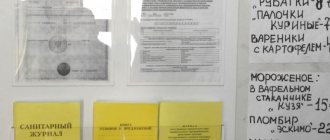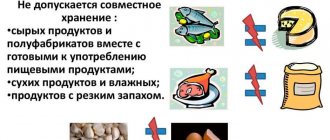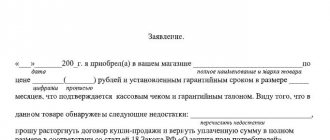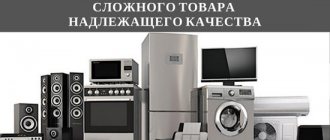Who in the Russian Federation exercises control over food products?
- State bodies of standardization and metrology that issue requirements for the composition, quality and properties of a particular food product. For 2020, the GOST document is not mandatory. The product manufacturer has the right to establish its own technical conditions (TS), but if the manufactured product has a standard number, then the quality must meet the requirements.
- Voluntary certification centers. Based on the results of the laboratory experiment, products are subject to declaration.
If the properties of the product coincide with the declared indicators, the certification center will issue the corresponding document. Only high-quality products are sent to the laboratory, and these centers very rarely fail. In case of refusal, the manufacturer has the right to contact another body - this leads to the conclusion that the declaration of this center is not a guarantee of the quality of the food product. - Manufacturer. Of course, the manufacturer is obliged to exercise control over the goods he produces. At the factory, testing is carried out in three stages:
- Analysis and evaluation of raw materials.
- Monitoring production, where the recipe, manufacturing technology, temperature, etc. are fully observed.
- Analysis of compliance of the product batch with technical specifications or GOSTs.
- Rospotrebnadzor. When a manufacturer registers a new product, this body fully checks all the necessary documentation confirming the composition and safety of the product. It also carries out scheduled and unscheduled inspections and laboratory tests in the event of complaints from consumers. If there are violations of sanitary standards, Rospotrebnadzor imposes a ban on the sale of this food product.
- Roskontrol. An independent organization evaluates the quality of goods in Russian stores. The purpose of this body is to provide reliable information about the product to the consumer. The company publishes the results of its research on its official website.
Often there may be unscrupulous manufacturers who try to circumvent the law. It should be remembered that product quality directly depends on the manufacturer - if he is not interested in it, then control will be nominal.
TOP 10 recommendations of Rospotrebnadzor for choosing products
As you know, the Federal Service for Surveillance on Consumer Rights Protection and Human Welfare supervises the observance of consumer rights, the quality and safety of food products. For this purpose, the department is developing simple and understandable recommendations for citizens.
We present to you the “ten” most relevant, simple and useful instructions on how to choose the right products and what to do if they turn out to be of poor quality.
If you bought a low-quality product
To ensure that all products on the shelves of Russian stores are safe, Rospotrebnadzor conducts test purchases, laboratory tests and chemical and biological examinations every day. Department specialists collect all possible data on different types of products to determine their compliance with mandatory requirements. The results of inspections reveal cases of sales of unsafe goods of various categories, including food products - milk and dairy products, canned food, vegetables, confectionery and culinary products.
So, imagine a situation where the product you bought turned out to be of poor quality. What to do in this case: where to go, who to call, where to start? Here is a simple algorithm of actions:
Read more about how Rospotrebnadzor monitors products in stores and markets.
Choosing fruits and vegetables
The end of September is harvest time, which means it's time to go shopping and compensate for the lack of consumption of fruits and vegetables. Rospotrebnadzor will help you determine how and where to buy seasonal products.
To begin with, pay attention to the storage conditions of the products - whether cleanliness is maintained, whether spoiled berries, fruits and root crops are disposed of in a timely manner, whether the area adjacent to the place of sale is cleaned. If you see dirt around or vegetables with signs of spoilage, refuse to purchase.
In order for fruits, vegetables and berries to bring maximum benefits and vitamins, carefully choose what you buy. Appearance, smell and consistency are the main parameters of fruits and vegetables.
A few more “tricks” when choosing vegetables and fruits can be found here.
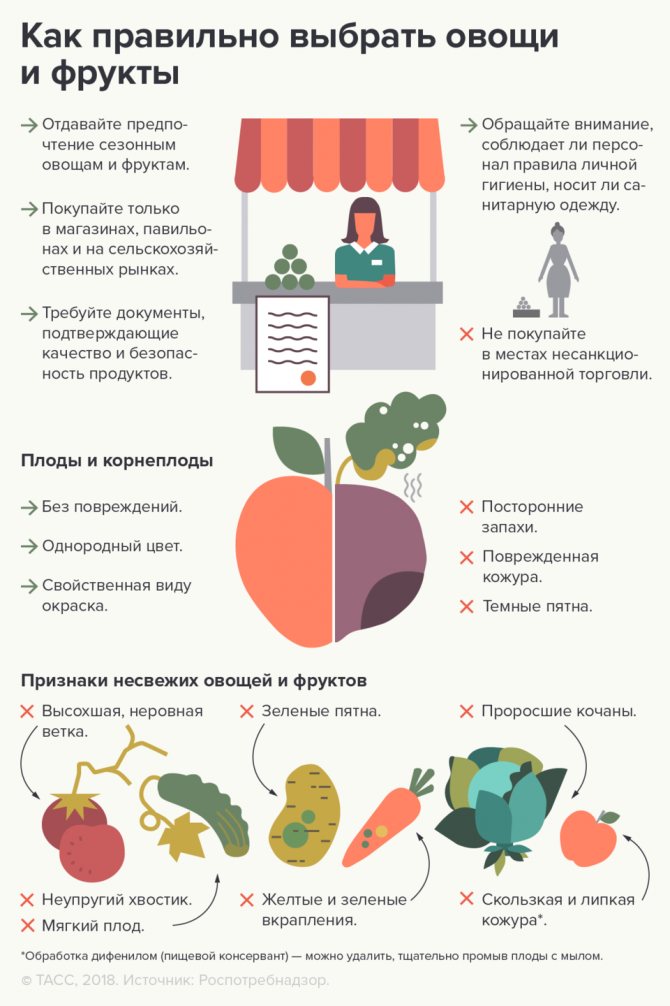
Choosing sour cream
Milk rivers, fermented milk banks... How to choose the right sour cream (the product is not entirely dietary, but at the same time it is a source of healthy milk fat, calcium and fat-soluble vitamins)?
When buying sour cream, you must not only read the information on the price tag, but also pay attention to the packaging of the product: it must be undamaged, hermetically sealed, without leaks, and with clearly readable markings.
It is also necessary to check whether the temperature conditions for storing the product in the store are met. If the temperature in the refrigerated display case is above +6°C, it is better not to buy such a product - it is dangerous and can cause food poisoning. Products that have expired are also dangerous. At home, after opening the package, sour cream must be used within 2-3 days.
Read the details in our article.
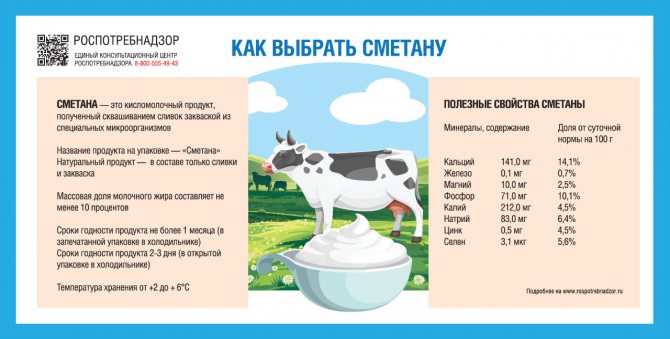
Choosing cheese
Say “syyyyyy” and smile! Natural cheese contains a large amount (20-30%) of easily digestible milk protein, many vitamins such as A, E, D, C, B vitamins, PP, as well as a large number of useful elements: iron, potassium, calcium, magnesium, copper , manganese, sodium, phosphorus, zinc.
Russian cheese producers have reached a new, higher level of development in recent years. The range of products offered by domestic cheese makers is not inferior to the world's leading manufacturers. Currently, there are a lot of cheeses on store shelves and making the right choice is quite difficult. Use our simple tips when choosing your favorite cheese!
More information about “life hacks” when choosing cheese can be found here.
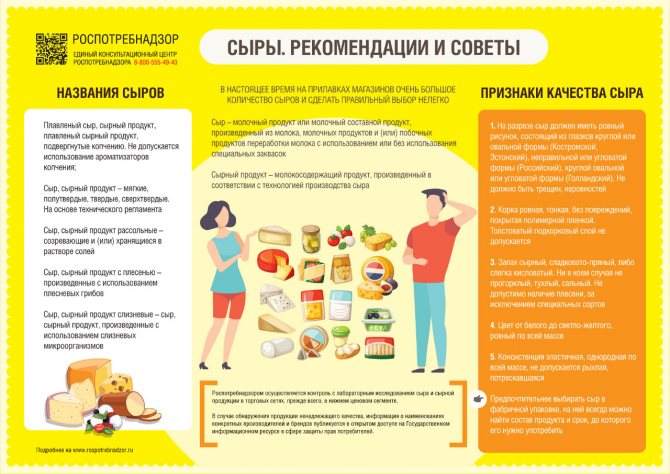
Choosing meat
There is an abundance of meat products in stores and markets. Before buying meat at the market or in a store, evaluate its appearance and color, the condition of fat and tendons, consistency, and smell.
Fresh meat is of high quality if it has:
- thin dry crust of pale red color;
- fat is white, cream or yellowish;
- the smell is fresh, natural, without spices, chemicals or signs of rot;
- dense consistency;
- the hole that forms when pressed quickly levels out;
- When cooked, a fragrant, clear broth is formed.
You will learn other recommendations on how to choose meat from our article at this link.
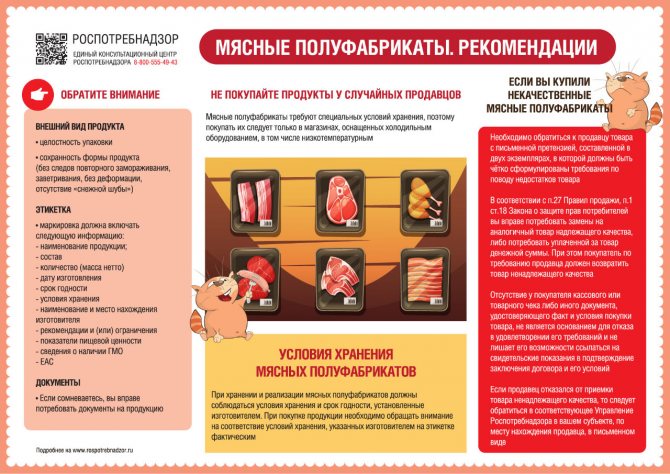
Choosing fish
Fish in stores can be bought in different forms: live, chilled, fresh-frozen, frozen.
We will tell you what signs frozen fish should have:
It is okay to have a glaze on the fish because it protects the fish from spoilage.
But know: the weight of glaze applied to frozen fish should not exceed 5% of the net weight, for shrimp and other seafood - 6% of the net weight. 14% can be applied to fillets.
The manufacturer must indicate on the packaging how much the fish weighs without glaze.
Tattered, crumpled fish that have a yellowish tint and dark spots, that have lost their shape or are generally “torn” are the best indicator that it has been defrosted and frozen again several times. The same is evidenced by the smell of old fat. The flesh of such fish exfoliates and spreads when defrosted.
Do you know what quality fish is? You can learn about preparing fresh and chilled fish from our article.
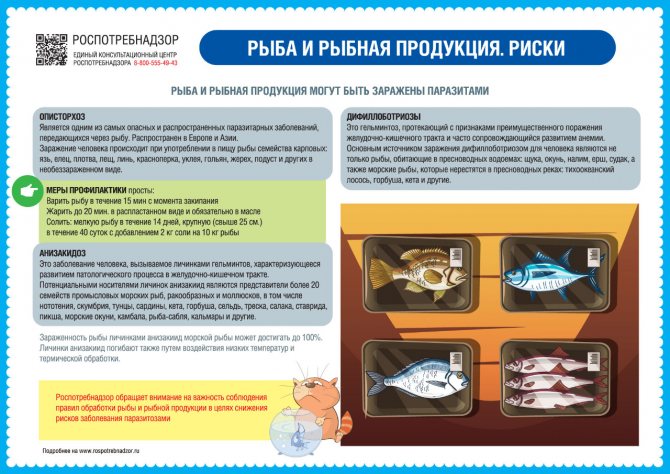
Choosing canned food
When buying canned fish you should also be careful. After all, this is a product that has a long shelf life, and sometimes too long if the seller is unscrupulous. Find out how to tell good canned goods from bad ones with our infographic.
When buying canned fish, be sure to pay attention to the appearance of the can - it is this that can tell you a lot about the product in front of you. If there is no marking on the can, but there are scratches and rust, this product is not worth buying!
Other details when choosing canned food can be found in our publication at this link.
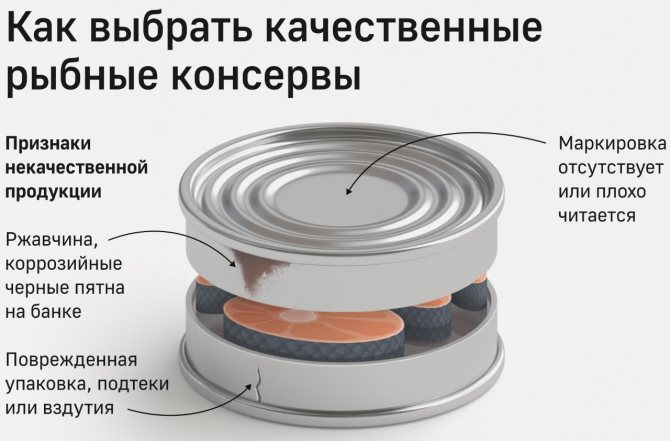
Picking mushrooms
Autumn is the time to pick mushrooms! Do you know where to collect and how to do it correctly? After all, mushrooms are a very insidious product.
To avoid mushroom poisoning, you need to follow simple rules:
Choose the cleanest places for collection: away from roads and highways, populated areas and industrial enterprises.
False mushrooms are found in forests. The rest are conditionally edible. And only the white mushroom, the real milk mushroom and the common saffron milk cap are definitely edible.
It is advisable to clear them of forest debris at the collection site and place them in a basket.
If you brought mushrooms from the forest or bought them, you need to process them on the day of collection.
What else does a real mushroom picker need to know? Rospotrebnadzor makes recommendations in the article.
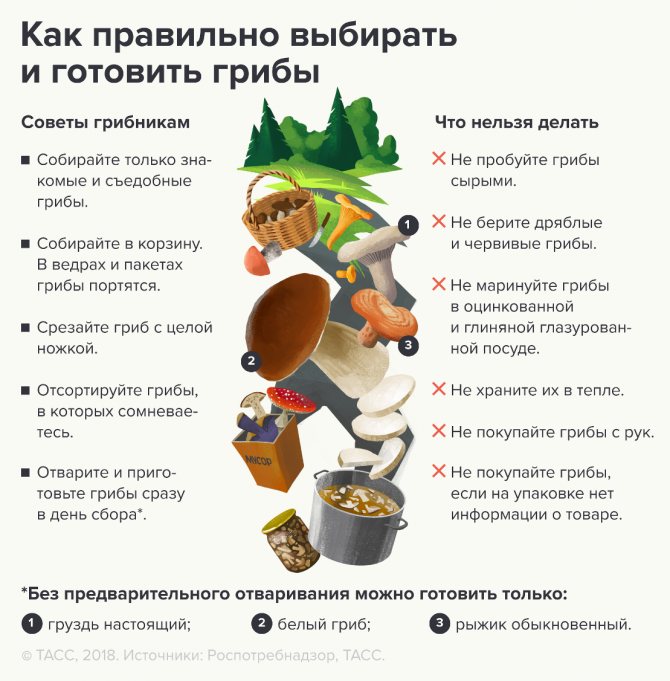
Choosing sauces/dressings
Even a completely tasteless dish can be “saved” by seasoning it with a high-quality sauce. However, when using sauces you need to know when to stop and be careful...
Rospotrebnadzor reminds that a large number of green leaves in salads does not automatically make dishes low-calorie and healthy. There are types of salads whose calorie content reaches 400 kcal per 100 g of product, so you should make sure that there are no “forbidden” ingredients in your dishes.
For example, two tablespoons of full-fat sour cream, mayonnaise, and honey-mustard dressing contain 200 kcal. This salad can hardly be called dietary, especially when it comes to store-bought mayonnaise or Caesar dressing.
How to choose mayonnaise, what you need to know about its storage and calorie content:
You can find out more facts about sauces and dressings in the article.
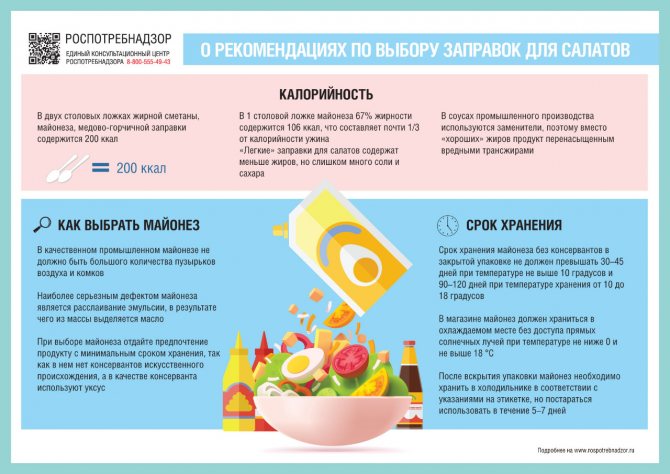
Choosing chocolate
And for “dessert” - recommendations for choosing chocolate...
Did you know that just recently, September 13th, was World Chocolate Day? This delicacy has a lot of fans and many “tricks” that you need to know when choosing chocolate to your taste...
The category of chocolate is determined by the percentage of cocoa. The higher the percentage, the better the chocolate is considered, and its taste is more “bitter”. Natural chocolate can only be called one that contains cocoa butter, and not other substitutes. A confection in which cocoa butter is replaced with sunflower, soybean, cottonseed and palm oils is called sweet confectionery bar.
Chocolate is a capricious product. If, during persistent heat, “fat bloom” appears on chocolate—cocoa butter begins to partially melt, appears in small droplets on the surface of the chocolate, and then hardens, forming gray spots, then when stored in the refrigerator, chocolate acquires “sugar bloom.” At low temperatures, water freezes out of it, and white spots of sucrose appear on the surface.
Learn more about the criteria for choosing chocolate.
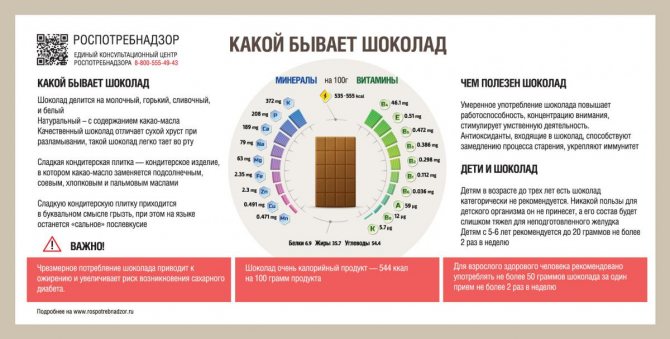
What does Rospotrebnadzor check in a grocery store?
As mentioned earlier, this body carries out both scheduled and unscheduled on-site inspections. Rospotrebnadzor inspections bring together several specialists from various fields.
Checked:
- Registration of labor relations with employees.
- Qualifications of employees, availability of health certificates.
- Certificates for products.
- Cash registers in trade.
- The quality of the product about which the complaint was made.
- Compliance of premises with standards.
Most often, unscheduled inspections of stores are carried out in connection with consumer complaints.
In addition, the following documents are checked:
- Constituent (TIN, Charter).
- Information about the control of premises (how temperature, cleaning, lighting, etc. are controlled).
- Licenses to carry out activities.
- Signs.
- Consumer corner.
- Information about prices, menu.
- For renting premises or the right to own them.
- Agreements with companies that provide waste removal, premises disinfection, and repair services.
- Logs of previous inspections by various authorities.
- Logbook for disinfection products.
Thus, if a violation is discovered, Rospotrebnadzor will draw up a protocol on an administrative violation (there may be a disciplinary, civil or even criminal violation) and issue an order to correct the identified violations or suspend the store’s activities until the shortcomings are eliminated.
Compensation in case of purchasing low-quality products
The quality of a product cannot always be judged by its external appearance. It may have a normal taste and smell, but after consumption it may cause health problems. This could be indigestion, poisoning in any form, damage to the esophagus by foreign objects in the product, or an allergic reaction. In such cases, you can contact Rospotrebnadzor or directly to the seller with a demand for compensation for treatment and restoration of health.
Such issues are rarely resolved pre-trial, so you need to be prepared for litigation and prepare an evidence base. It is necessary to conduct an examination and have a written conclusion about the quality. Collect and attach to the claim evidence of treatment costs. These could be receipts from the purchase of medicines or visits to medical institutions.
Important: to conduct an examination of low-quality food products purchased in a store, you can contact Rospotrebnadzor. State supervision and control authorities will determine the compliance of food products with sanitary standards and issue a decision on the possibility or impossibility of consuming the product.
If the court takes the plaintiff’s side, he will be compensated for all costs of treatment, examination and purchase of goods.
Important: The amount of moral damage is assessed by the injured party independently. At the discretion of the judge, this amount can be left unchanged, reduced or even canceled.
Register now and get a free consultation from Specialists
Where can I see the list of products that have not passed the test?
If you doubt the quality of a food product, check its quality online. There are 2 ways to do this, which we will discuss further.
Information about violations on the Rospotrebnadzor website
After inspections, this government agency posts here the names of goods that did not pass the inspection. It contains a list of food products tested by Rospotrebnadzor, which contain facts of violation of the requirements of technical regulations. There you can also find:
- Name of product;
- information about the manufacturer (production date, country, document);
- non-conformity indicator;
- region.
Using special filters you can select:
- separate region;
- product type;
- violation of compliance;
- Name of product;
- manufacturer;
- country of origin;
- production date;
- availability of a document confirming compliance with the CU TR.
This way you can find the necessary food product by name or manufacturer, which is considered very convenient.
How to return a low-quality food product without a receipt and with a receipt
If the quality of the product is visible to the naked eye or you have an expert’s opinion on hand, then you need to contact the retail outlet where it was purchased. You must have with you:
- cash or sales receipt;
- defective goods;
- written expert opinion (if necessary).
If the sale was made without issuing a receipt or it was lost, then witness testimony is required that can confirm the fact of purchase in this particular store. You can also request video from surveillance cameras. It will be irrefutable evidence that the damaged product was purchased from this seller.
Results
The laboratory technician issues a conclusion that states how suitable the product is for consumption, its composition and test results, and the presence of microorganisms. There are three possible outcomes:
- the product turned out to be of poor quality due to the fault of the manufacturer or seller;
- the sample turned out to be of high quality;
- the sample turned out to be of poor quality, but whose fault is unknown.
If a product is prohibited for consumption or found to be counterfeit, then the entire batch must be destroyed and the manufacturer subjected to an unscheduled inspection by Rospotrebnadzor. The consequences will be determined based on the results of such verification. Most likely, this will be a fine, suspension of activities, or referral of the case to court.
If the seller or manufacturer does not agree with the conclusions or does not trust the expert, they have the right to independently order research in another laboratory or immediately file a claim with the court, which will order its own inspection during the proceedings.
Order of conduct
The research is carried out in several stages:
- Purpose: This may be a scheduled inspection of the manufacturer or seller, or an unscheduled inspection based on a human complaint or mass poisoning.
- First, inspectors examine the documentation, perform an external inspection, analyze the condition of packaging, labeling, conditions of transportation, storage and sale.
- Then samples are taken for study and directly physicochemical and microbiological analyses. Experts decide whether the product is suitable for food, how dangerous it is to health, and whether the information stated on the packaging about the composition and expiration date corresponds to the actual contents.
- The results are formalized in the form of a conclusion on permission or a resolution banning the use of the product.
- If a decision is made to destroy products, then disposal methods are agreed upon with the authority that made this decision.
- If there is a quality certificate for products unsuitable for food, it will be suspended at the request of the inspection body.
- The results can be appealed legally.
Types of examinations
The use of a specific type depends on the purpose pursued by the customer.
Veterinary and sanitary
Allows you to determine the good quality of livestock products:
Free HOTLINE:
Moscow time 8 (499) 938 6124
St. Petersburg 8 (812) 425 6761
Fed 8 (800) 350 8362
- eggs;
- fish;
- milk and fermented milk derivatives;
- meat;
- cheese.
Animals also need such a check; they are examined for diseases and infections.
It is carried out using microbiological, histological, physical, chemical and other methods. Veterinary doctors and paramedics at meat industry enterprises and control stations of food markets have the right to carry out veterinary and sanitary examinations.
Sanitary and hygienic
The task of sanitary and hygienic examination includes:
- determination of organoleptic properties;
- identifying changes in the chemical composition of the sample and their causes;
- bacterial contamination;
- establishing the amount of pesticides and food additives;
- clarification of the conditions of production, storage and sale;
- investigation of possible transmission of infections.
It will become clear whether food can be used for food, what conditions of sale must be met (for example, heat treatment, industrial processing). If the sample is found unsuitable for food, the expert will indicate the method of destruction: as animal feed or disposal.
Physico-chemical
Reagents and special equipment are used. The purpose of the check is to identify certain parameters:
- moisture level;
- energy value;
- harmful impurities;
- pathogenic bacteria;
- nutrient ratio.
Microbiological
Microbiological analysis can reveal the presence of pathogenic microorganisms, toxins and foreign contaminants. It is carried out by persons with special professional training using laboratory equipment. The analysis reveals the fact and reasons for the development of biological processes in any food product.
Commodity
Commodity examination is the main type of examination of goods and food products. It includes an assessment of all product characteristics: quantitative, qualitative, assortment, cost. Organoleptic, physico-chemical, microbiological, technical parameters are tested and weighed.
Planned
Carried out by state supervisory authorities of Rospotrebnadzor or Roskontrol with the frequency prescribed by current legislation.
The goal is to determine the suitability of food supplies, as well as the following parameters:
- quality;
- absence of harmful impurities and microorganisms;
- amount of food additives and preservatives, heavy metals;
- compliance of containers with sanitary requirements;
- nutritional value;
- content of nutrients, microelements, vitamins, degree of fortification.
Unscheduled
Unscheduled is carried out in special cases:
- Suspicion of food poisoning or infection, complaints from citizens about poor quality, an incident of infection during an accident in housing and communal services, transportation that does not meet sanitary standards.
- Judicially.
- on behalf of higher government bodies.
Legislation
- The Civil Code of the Russian Federation regulates relations in the field of property, non-property and intellectual rights, compliance with property rights, and contractual obligations.
- Federal Law of the Russian Federation dated May 4, 2011 No. 99-FZ “On licensing of certain types of activities” contains a list of works for which a license is required.
- Federal Law of the Russian Federation dated 02/07/1992 No. 2300-1 “OZPP” establishes standards for interaction between sellers (suppliers) and buyers, defines the concept of quality of services and goods and prescribes a mechanism for protecting rights.
- Decree of the Government of the Russian Federation dated December 1, 2009 No. 982 “On approval of a unified list of products subject to mandatory certification” provides a list of goods that must have a quality certificate.
- Federal Law of the Russian Federation dated May 31, 2001 No. 73-FZ “On State Forensic Expert Activities” lists the rules for the work of an appraiser.
- SanPiNy.
- GOST standards.
